
-
 Afrikaans
Afrikaans -
 Albanian
Albanian -
 Amharic
Amharic -
 Arabic
Arabic -
 Armenian
Armenian -
 Azerbaijani
Azerbaijani -
 Basque
Basque -
 Belarusian
Belarusian -
 Bengali
Bengali -
 Bosnian
Bosnian -
 Bulgarian
Bulgarian -
 Catalan
Catalan -
 Cebuano
Cebuano -
 Corsican
Corsican -
 Croatian
Croatian -
 Czech
Czech -
 Danish
Danish -
 Dutch
Dutch -
 English
English -
 Esperanto
Esperanto -
 Estonian
Estonian -
 Finnish
Finnish -
 French
French -
 Frisian
Frisian -
 Galician
Galician -
 Georgian
Georgian -
 German
German -
 Greek
Greek -
 Gujarati
Gujarati -
 Haitian Creole
Haitian Creole -
 hausa
hausa -
 hawaiian
hawaiian -
 Hebrew
Hebrew -
 Hindi
Hindi -
 Miao
Miao -
 Hungarian
Hungarian -
 Icelandic
Icelandic -
 igbo
igbo -
 Indonesian
Indonesian -
 irish
irish -
 Italian
Italian -
 Japanese
Japanese -
 Javanese
Javanese -
 Kannada
Kannada -
 kazakh
kazakh -
 Khmer
Khmer -
 Rwandese
Rwandese -
 Korean
Korean -
 Kurdish
Kurdish -
 Kyrgyz
Kyrgyz -
 Lao
Lao -
 Latin
Latin -
 Latvian
Latvian -
 Lithuanian
Lithuanian -
 Luxembourgish
Luxembourgish -
 Macedonian
Macedonian -
 Malgashi
Malgashi -
 Malay
Malay -
 Malayalam
Malayalam -
 Maltese
Maltese -
 Maori
Maori -
 Marathi
Marathi -
 Mongolian
Mongolian -
 Myanmar
Myanmar -
 Nepali
Nepali -
 Norwegian
Norwegian -
 Norwegian
Norwegian -
 Occitan
Occitan -
 Pashto
Pashto -
 Persian
Persian -
 Polish
Polish -
 Portuguese
Portuguese -
 Punjabi
Punjabi -
 Romanian
Romanian -
 Russian
Russian -
 Samoan
Samoan -
 Scottish Gaelic
Scottish Gaelic -
 Serbian
Serbian -
 Sesotho
Sesotho -
 Shona
Shona -
 Sindhi
Sindhi -
 Sinhala
Sinhala -
 Slovak
Slovak -
 Slovenian
Slovenian -
 Somali
Somali -
 Spanish
Spanish -
 Sundanese
Sundanese -
 Swahili
Swahili -
 Swedish
Swedish -
 Tagalog
Tagalog -
 Tajik
Tajik -
 Tamil
Tamil -
 Tatar
Tatar -
 Telugu
Telugu -
 Thai
Thai -
 Turkish
Turkish -
 Turkmen
Turkmen -
 Ukrainian
Ukrainian -
 Urdu
Urdu -
 Uighur
Uighur -
 Uzbek
Uzbek -
 Vietnamese
Vietnamese -
 Welsh
Welsh -
 Bantu
Bantu -
 Yiddish
Yiddish -
 Yoruba
Yoruba -
 Zulu
Zulu


Jul . 28, 2025 14:01 Back to list
Premium Cable Stripping Tool for Precise and Easy Wire Stripping
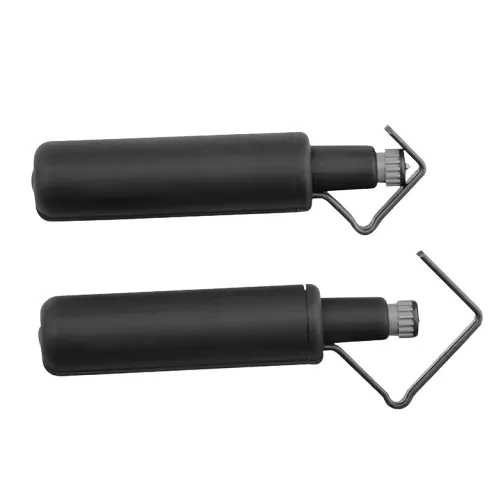
The Cable Stripping Tool stands as a pivotal product in modern electrical wiring, telecommunication, energy distribution, petrochemical engineering and automation sectors. With the global cable accessories market (Statista, 2023) surpassing USD 62 billion—and forecasted 5.5% CAGR to 2029—demand for efficient, accurate, and safe cable preparation is intensifying.
This article presents an authoritative, in-depth exploration of Cable Stripping Tool from market trends to technical specifications, manufacturing techniques, industrial benchmarks, application scenarios, competitive analysis, customization solutions, and real-world case studies.
1. Industry Trends & Market Insights
- Automation and precision dominate technical upgrades: Industry 4.0 pushes tools toward micro-adjustment, self-calibration & robust error-proofing.
- Material innovation: Thermally optimized carbon steel, anti-corrosive alloys, and engineering plastics improve durability & comfort.
- Oil & Gas, metallurgy, shipbuilding and EV infrastructure are key growth fields demanding high safety and anti-fatigue tools.
- Adherence to ISO, ANSI & IEC standards is a decisive purchase factor—especially for international projects.
2. Technical Specifications of Cable Stripping Tool
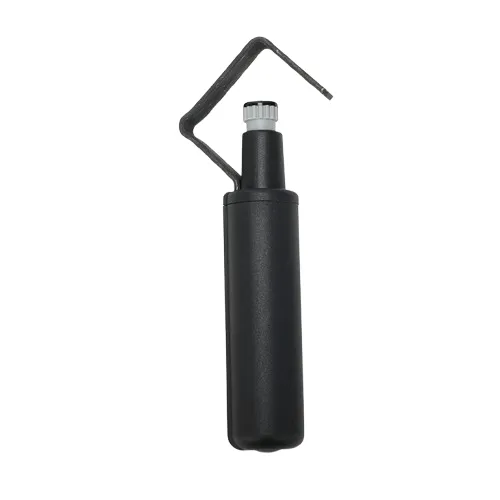
The Cable Stripping Tool is engineered for rapid, repeatable, and non-destructive cable insulation removal. Let’s review its primary technical parameters and how they impact performance across industrial tasks.
| Parameter | Value/Range | Industry Benchmark | Impact on Use |
|---|---|---|---|
| Applicable Cable Diameter | Ø 2 - 35mm | ISO 5749 | Wide compatibility with LV, MV, HV, and co-axial cables |
| Blade Material | SK5 Alloy Steel / Carbide | ANSI B107 | Long edge life; repeated precision stripping |
| Handle Material | TPR-coated High Grade Plastic | IEC 60900 | Ergonomic grip; anti-slip and insulated up to 1kV |
| Cutting Depth | 0.05 - 5.0 mm (adjustable) | IEC 60352 | Safe sheath removal; adapted for thin/thick insulation |
| Operating Life | > 40,000 cycles | Lab-tested | Supports heavy-duty daily industrial usage |
| Norm Compliance | ISO 5749, ANSI, RoHS | Required for export/EPC contracts | Project acceptance without revalidation |
| Net Weight | 180 - 380g | Lightweight | Portable; operator fatigue reduced |
3. Manufacturing Process of Cable Stripping Tool
The Cable Stripping Tool is produced via a multi-stage sequence, ensuring mechanical strength, geometry consistency, corrosion resistance and user safety. Below is a flowchart summary and detail on critical links.
Certified SK5/T10 high-carbon steel; RoHS compliant engineering plastics for handle/guard components.
High-tonnage forging for basic blade shape, CNC for micron-level blade / seat / guide rails.
Blade hardening (HRC 58-62), tempering to balance toughness and cutting edge integrity.
Hand/manual assembly of blade, handle, safety latch, adjustable depth mechanism.
Electroplating, Teflon/EPD coating, anti-corrosion oil.
Dimension, safety, stripping cycle and sharpness per ISO 5749/ANSI B107.
ESD and impact protected, batch barcode for traceability.
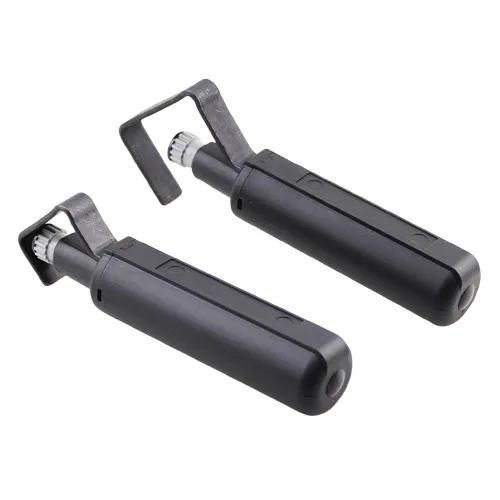
Below: manufacturing site (short demo video) ▶ Watch process video
- Material & Durability: 68% body composed of carbon/allow steel; blade endurance avg. >40,000 cycles (tested per IEC 60900); lifespan 3-7 years under industrial use.
- Standards: Each unit QC-inspected / documented per ISO 5749, ANSI B107, RoHS, CE (see docs: ISO 5749:2004).
- Traceability: Each batch marked/recorded for downstream liability and warranty.
4. Key Advantages of Cable Stripping Tool
- Compatible with Wide Gauge Range (2~35mm Ø): Ideal for power, control, telecom, elevator, PA cables, automotive and more.
- Consistent Precision Stripping: Micro-adjustable depth, securing both thin and thick insulation without copper/nickel core nicks.
- Robust Ergonomics: TPR/ABS grips minimize operator fatigue, anti-slip for wet/greasy environments.
- Superior Corrosion Resistance: EPD/Chromed coatings suit marine, offshore, chemical, and humid sites.
- Ambidextrous, Safe Design: Guarded blade, safety click, cable diameter index, one-hand operation, recoil safe.
- Compliance with Global Certification: IEC, ISO, ANSI and RoHS—critical for EPC, O&M, bidding on international projects.
5. Product Benchmarking: Manufacturer Comparison Table
| Attribute | Bilopowtel Cable Stripping Tool | Klein Tools 11063W | Weicon No.7 | Generic OEM Brand |
|---|---|---|---|---|
| Cable Range | 2–35mm Ø | 8–28mm Ø | 5–28mm Ø | 4–26mm Ø |
| Blade Material | SK5 High-Carbon Alloy | Stainless Steel | Tool Steel | Unknown Steel |
| Micro Depth Adj. | 0.05mm–5.0mm | Yes | Yes | No |
| Compliance | ISO, ANSI, RoHS | IEC, ANSI | CE, RoHS | Unknown |
| Use Life (cycles) | >40,000 | ~12,000 | ~20,000 | ~8,000 |
| Handle Safety | TPR/ABS Insulated, Ergonomic | Plastic Non-slip | Plastic + Grip | Bare Plastic |
| Warranty | 3 Years Replacement | 1 Year | 1 Year | 6 Months |
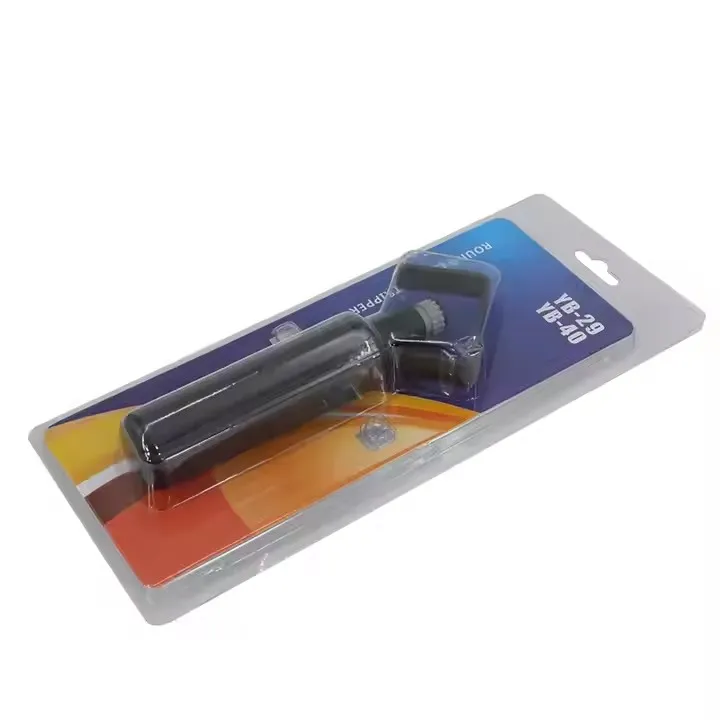
Above: Data aggregated from manufacturer datasheets, ANSI reports, and major e-commerce QA statistics.
6. Custom Solutions & OEM/ODM Support
- Custom blade geometry for sectoral, subterranean or armored cables on request.
- Handle grip color/branding, unique serialization, QR code traceability available for OEM/ODM.
- Adapted anti-corrosive coatings (Ni/EPD) for marine/chemical facilities.
- Special adjustment modules for ultra-fine coax/broadcast cables (
- Drop test, salt-spray test, insulation test (IEC 60900) certification offered per batch.
- Technical consultation on-site for turnkey integration in EPC or O&M projects.
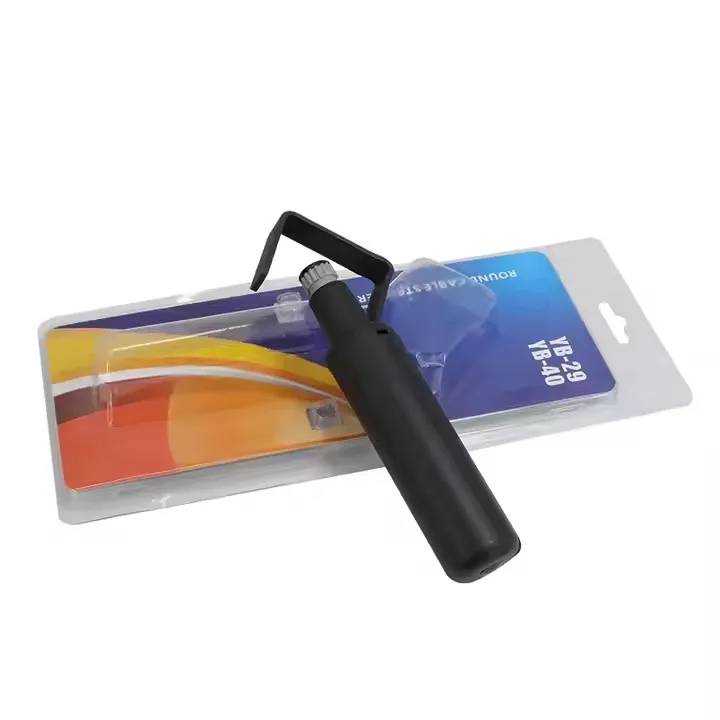
7. Typical Application Scenarios
- Onsite Electrical Installation: Streamlines cable prep for switchgear, distribution boards—minimizing fire risk and downtime.
- Telecom & Data Centers: Consistent sheath scoring avoids accidental damage to shielded/high-frequency lines.
- Factory Maintenance: Robust corrosion resistance and >3yr field life in caustic, wet and metallic-dusty environments.
- Infrastructure/EPC Projects: Guaranteed compliance for project audits and acceptance.
- Oil, Gas, Mining, and Marine Facilities: Proven under high salt, chemical mist, and vibration exposure.
- Rail Transit & Green Energy: Safeguards insulation on converter, traction, and solar PV cabling.
8. Professional FAQ for Cable Stripping Tool
9. Delivery, Warranty & Customer Support
- Standard lead time: 7–18 working days after order confirmation, faster for repeat/OEM clients.
- 3-year global warranty; free replacement for defects or premature wear upon inspection.
- 24/7 online technical support; full traceability by serial/batch for warranty claims.
- Comprehensive instruction, video manuals, and onsite commissioning support available.
10. Real-World Case Studies
Petrochemical Plant Upgrade—East Asia, 2023:
During a 2023 overhaul, three EPC partners adopted the Cable Stripping Tool for over 12,000 LV/MV cable terminations. Reported stripping accuracy rates >98%, observed rework rate
Renewable Energy: Large-Scale Solar Farm, Europe, 2022:
For 80,000 meters of 6-16mm² PV cabling, maintenance teams noted a 33% reduction in labor vs. traditional knives, zero injury incidents, and >36,000 cycle blade life before replacement.
Data Center Expansion—North America, 2022:
Precision sheath removal crucially minimized fiber/UTP scrap; users valued anti-fatigue handle and swift core change-out capability.
Key Client Feedback:
- “Besthand feel among 4 top brands in our field test, especially when precision matters for sensitive cables.” – Senior Engineer, C&I, Singapore Site.
- “Compliance docs for ISO and traceability made acceptance audits hassle-free.” – QA Specialist, French EPC contractor.
11. Authority & Partners
ISO 5749/9001 Certified
IEC 60900 Compliance
ANSI B107 Registered
RoHS Directive
CE, SGS Test/Certificates
12. References & Further Reading
- ElectricianTalk Forum: Stripping Tool Field Tests & Ranking
- Elsevier Journal of Materials Processing Technology – Advances in Tool Steel Blades, Vol. 306
- ISO 5749:2004 – Pliers and Nippers – Stripping Pliers Requirements
- Cable Accessories Market Insights – MarketsandMarkets 2023
- ANSI B107 Standards: Hand Tools
- Electronics Weekly: Technology Parameters for Cable Stripping Tools (2023), News/Analysis
Latest news
What Are Construction Tools and How Are They Used?
NewsJul.11,2025
Professional-Grade Duct Rodding Tools for Superior Cable Installation
NewsJul.11,2025
Enhancing Safety and Efficiency with Modern Hot Stick Solutions
NewsJul.11,2025
Empowering Cable Installation with Advanced Rodder Solutions
NewsJul.11,2025
Elevate Your Cable Installation Projects with Cable Pulling Tools
NewsJul.11,2025
Efficient Cable Handling Solutions: Cable Rollers for Sale
NewsJul.11,2025











